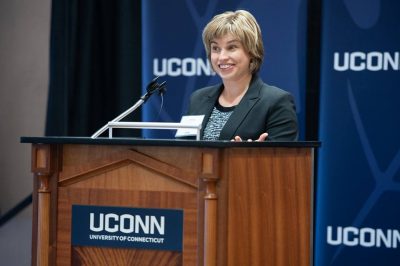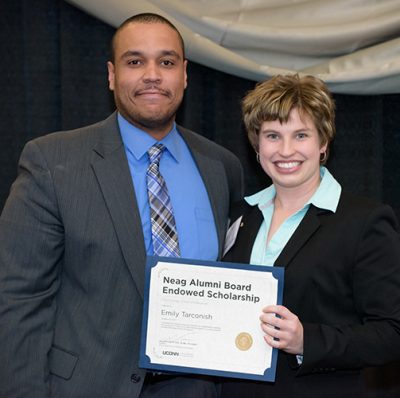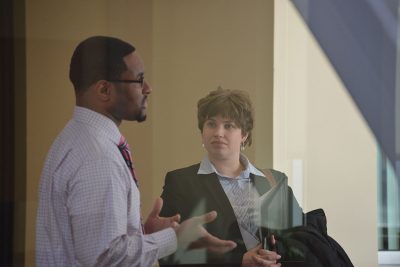In our recurring 10 Questions series, the Neag School catches up with students, alumni, faculty, and others throughout the year to offer a glimpse into their Neag School experience and their current career, research, or community activities.

Emily Tarconish is a Ph.D. candidate in Neag School’s educational psychology program with a concentration in special education. She is a survivor of a traumatic brain injury (TBI) she endured at the age of 15. With years of hard work and rehabilitation, Tarconish has relearned how to walk, speak, and regain basic life functions. Once she completes her Ph.D., she plans to pursue research focused in part on improving access to higher education for college students with TBIs.
Why did you decide to pursue a Ph.D. in special education? My desire to pursue a Ph.D. in special education was sparked by my own experience as a person with a disability, as well as my work counseling other college students with disabilities as a director of student accessibility services and licensed rehabilitation counselor. When I was 15, I endured a severe traumatic brain injury that would change my life forever. I spent weeks in intensive care and inpatient rehabilitation, relearning to walk, speak, and regain basic life functions. I had no memory of the first 15 years of my life, and now possessed cognitive deficits, including those that would impede my abilities to form new memories, pay attention, or organize information.
“It is my mission to help other people with disabilities access the accommodations they need and empower themselves to achieve their goals.”
— Emily Tarconish, Ph.D. Candidate
Perhaps the greatest challenge I faced in my rehabilitation was realizing that no matter how much progress I made, I would still require some form of support throughout my life. Instead of allowing this to limit me, I decided to proactively coordinate the assistance I required and make myself as independent as possible. Now as a doctoral student, it is my mission to help other people with disabilities access the accommodations they need and empower themselves to achieve their goals.
As someone who has survived a TBI, can you share a bit of insight into the sorts of day-to-day challenges you have faced, specifically from the perspective of a college student? Because our brains control everything we do and are, when someone endures a brain injury, every aspect of their person can be affected. This was the case for me. Immediately after my injury, and for months, even years, I worked to regain my physical stamina and cognitive abilities, as well as cope with and adapt to possessing new deficits and a changed brain. Sixteen years later, you would think the brain, the fastest healing organ in the body, would have repaired itself! Unfortunately, many people with TBI, myself included, continue to experience residual impairments for the rest of their lives.

For instance, I continue to experience cognitive deficits, including those affecting short-term memory, attention, processing speed, et cetera. I also experience enduring physical issues, such as chronic fatigue and headaches/migraines, and residual weakness on the left side of my body, the latter of which has caused additional injuries. While I have remained committed to higher education, after my injury, I had to accept that learning would be harder and take a lot more time. For example, because of memory deficits, I typically have to read course material two to three times to be able to retain it. Attention also complicates academic tasks, such as memory, but can additionally interfere with concentrating in class, when studying or notetaking. I use assistive technology and work with the Center for Students with Disabilities to alleviate these issues.
As far as the physical/chronic issues are concerned, their remediation really takes a lot of planning. I need to make sure I don’t schedule too many classes/meetings in a day so I can drive safely/not become fatigued. I need to have a flexible schedule also in case I experience a migraine, so I try to make sure my week’s plans always have options built into them. Overall, most tasks take a lot longer when you have TBI, so I need to make sure that I am starting work early, planning ahead, and thinking about options and backup plans in case I hit any roadblocks and need to adapt.
As a doctoral student, you have received funding through various Neag School scholarships. In what ways has the funding impacted you and your experience here at the Neag School? I am so incredibly appreciative of the Neag School scholarships, which have allowed me to not worry about paying my tuition expenses. As I realize the brain can always improve and heal, I continue to engage in cognitive rehabilitation, as well as work with specialists to build my abilities and maintain my progress. Unfortunately, these practices and visits can add up financially. I truly strive to make my education a No. 1 priority, but needing to constantly fund health-related issues can be burdensome when trying to save money for school. Receiving the Neag School scholarships helped alleviate this financial burden by supporting my tuition, which lessened the pressure on me to finance it independently.
My areas of research study the experiences of students with disabilities, who often have additional financial needs relating to medical expenses, rehabilitation, and other services. As such, it is important to realize that students with disabilities may possess increased financial responsibilities. While civil rights laws have guaranteed equal access and reasonable accommodations to college students with disabilities, these individuals may still be at a financial disadvantage, which in turn may create barriers to their higher education. Hopefully, institutions of higher education will continue to afford equally to students facing these issues through policy, but also through financial support.

What is the focus of your dissertation research? The special education doctoral program I’m in focuses on students with disabilities transitioning from high school to college or employment. I’m currently working with Allison Lombardi on a project that examines a curriculum, EnvisionIT, for students in high school special education programs that helps them to enhance their transition abilities and prepare for life after high school. As I progress through the program, I plan to undertake research that assesses the experiences of college students with TBIs, just like me, as this population is growing at a rapid rate. Young adults experience one of the highest incidences of TBI and as every brain injury is different, every college student will require unique support to meet his or her needs. As I have experienced the challenges that accompany being a college student with a brain injury, I am determined to help create a more accessible path of higher education for other survivors of TBI.
While participating with the doctoral program here at UConn, what have you been most proud of? UConn has given me so many opportunities to learn about the experiences of college students with disabilities and participate in projects to benefit them. One current project involves interviewing college students with disabilities and using these interviews to create professional development videos for faculty, as well as disability awareness videos for other college students. This project allowed me to combine my interests in qualitative inquiry with my desire to create opportunities for actual students to inform the narrative about their experiences with disability. I am proud of this project as I was able to apply my research as well as creative skills to produce tools that others can use to learn more about disability from a first-person perspective.
How has the role of serving as director of student accessibility services at Clark University helped you in your studies at UConn? My experience at Clark really shaped my academic and research interests. During my time working with college students with disabilities, I made so many connections to students experiencing various diverse abilities and truly learned about the diverse pathways to achieving academic goals.
As fulfilling as this aspect of my time at Clark was, I also witnessed many issues that college students with disabilities continue to face in postsecondary education, as well as in their transition to further education or employment. These experiences developed my passion to contribute to postsecondary education and disability research and to continue to help push the field forward. Having firsthand experience with the population I study will continue to inform my work, as I am constantly reminded of the personal aspect of the work and research we do. This perspective really influences me to ensure that research is accessible to the people it is intended to help, as well as always closely informed by their lived experiences.
“As I have experienced the challenges that accompany being a college student with a brain injury, I am determined to help create a more accessible path of higher education for other survivors of TBI.”
In your undergraduate and graduate work at Penn State, you transitioned from a double major in English and women’s studies to a master’s degree in rehabilitation counseling; how will your undergrad experiences benefit you moving forward? When I arrived at Penn State, I knew I enjoyed reading and writing, especially when it involved learning about the experiences and narratives of others. My time studying English literature and women’s studies allowed me to consider the power of language to convey the diverse experiences of individuals. I learned about the journeys, obstacles, oppression, and marginalization that many people face, and as I approached the end of my undergraduate career, the stories to which I most connected were those of individuals with disabilities. I realized that I wanted to use the abilities I developed in college to work directly with this group and help people with disabilities to find ways to continue to tell their stories. My undergraduate experience studying English and women’s studies directly influenced my interest in qualitative research. Further, it gave me the critical thinking skills to always consider the complex lived experiences of those with whom I work, which relates to concepts of accessibility and inclusion.
Through your doctoral studies, you have gotten involved with Neag School’s Postsecondary Disability Training Institute (PTI). How has this professional conference impacted you? PTI has been instrumental in my doctoral studies. I first attended PTI when I was a disability services provider at Clark, which is how I learned about the educational psychology Ph.D. program at UConn! Now as a Center on Postsecondary Education and Disability graduate assistant, I work with Drs. Joe Madaus and Allison Lombardi to help facilitate the conference, which is an incredibly beneficial experience for me. PTI allows me to stay connected with practitioners who serve students firsthand and enables me to interact with the providers who actually use the research we develop; further, disability services providers are the individuals who help to inform how “best practice” continues to evolve.
My commitment to allowing students with disabilities to shape the narrative of their experiences is important, but that is only one side of the coin; in order to learn about how disability services are actually functioning, it is important to engage with current providers and incorporate their feedback and perspectives into the work and research we do. Also, they are the voices that inform what future research needs to be done.
What is something others may not realize when they meet you? One of the tricky pieces about having a brain injury is that it’s an invisible disability. Looking at me, most people don’t realize the impairments that I deal with every day, and more importantly, don’t know about the services, appointments, and all of the people behind the scenes who are helping me succeed.
What are your ultimate career goals? After completing my Ph.D., I hope to work as a professor at a university that allows me to both teach and complete research involving college students with disabilities and how to improve access for them. I could see myself working in a range of academic departments, including special education, rehabilitation counseling, higher education, or disability studies, but am committed to continue researching the experiences of college students with brain injuries and finding ways to improve access for them, as well as helping them to achieve positive academic outcomes. I am so fortunate to have experienced a strong recovery, thanks to rehabilitation, my dedicated family, and educators around me — I want to dedicate my life to creating tools and programs that will help other young people with TBI to progress in their recoveries and to achieve their goals.
Read past installments of the Neag School’s 10 Questions series here.
 Facebook
Facebook
 Twitter
Twitter
 LinkedIn
LinkedIn
